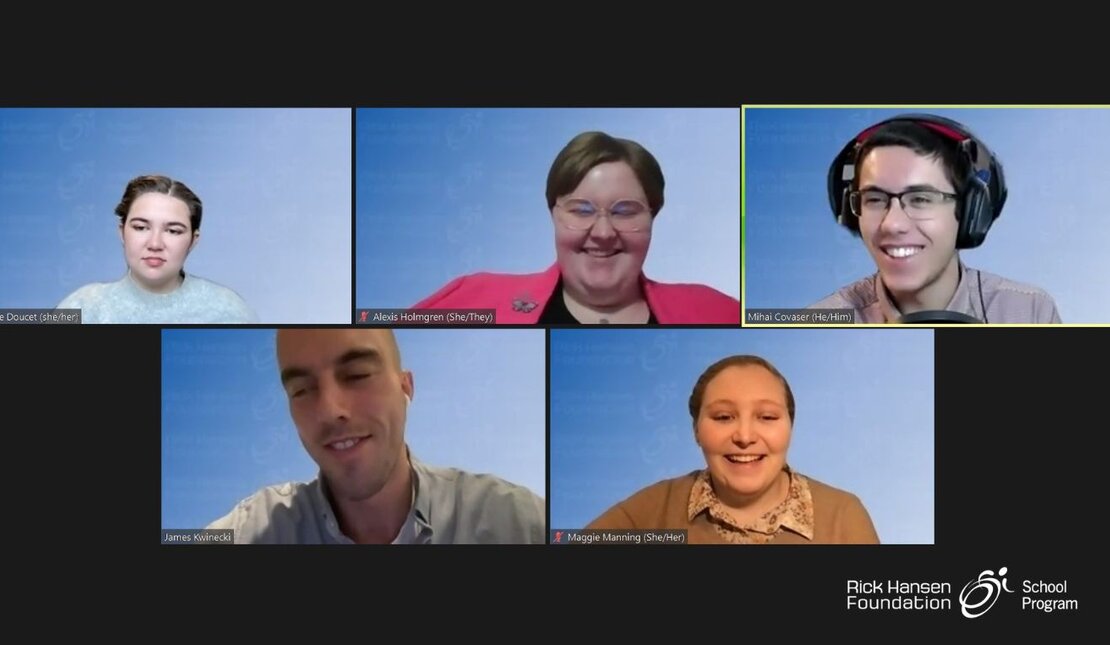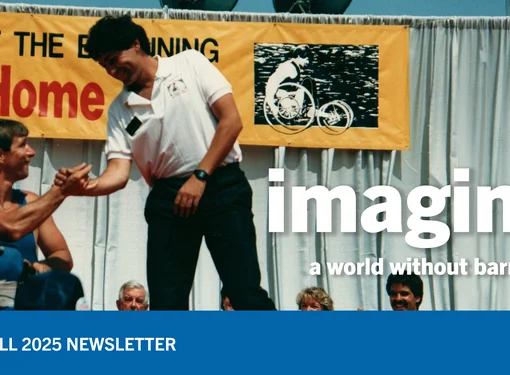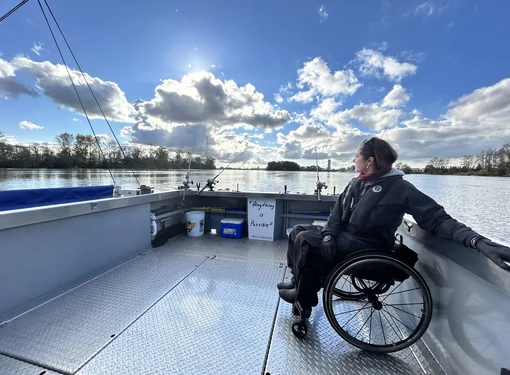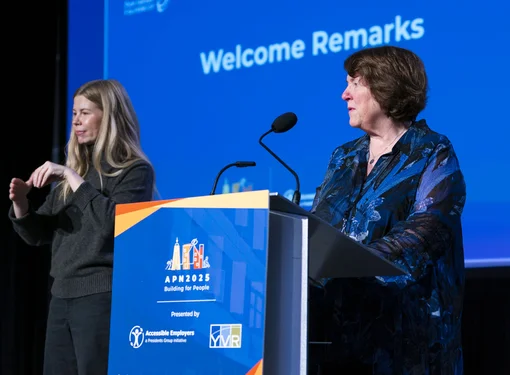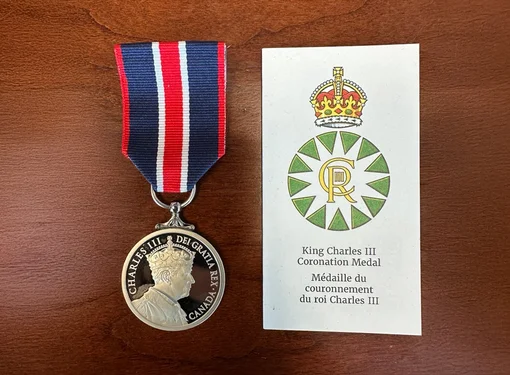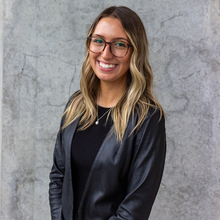Youth Exchange: Disability and Social Justice – A Recap
In honour of International Day of Persons with Disabilities, which takes place annually on December 3rd, the Rick Hansen Foundation School Program (RHFSP) virtually brought together members from RHFSP’s Youth Leadership Committee to discuss topics such as social justice and the social model of disability.
Le francais suit l'anglais
This hour long, interactive conversation was moderated by Mihai Covaser, a youth leader who has lived experience as a person living with cerebral palsy (CP). Shortly after his family immigrated to Canada, Covaser began working with a variety of organizations as an advocate, fundraiser, event organizer, and, most recently, committee chair for the Youth Leadership Committee.
The four panelists brought their unique experiences, perspectives and thought-provoking dialogue to the discussion:
- Alexis Holmgren – Alexis is a youth changemaker, rare disease patient advocate, 2021 RHFSP Difference Maker of the Year award recipient and published writer from Red Deer, Alberta. She has been a passionate advocate for diversity, inclusion, and accessibility from the age of 12, drawing from her personal experience as a young person living with multiple life-threatening rare genetic disorders to create change for a more inclusive and accessible world.
- James Kwinecki – James is studying Sociology and Social Justice Studies at the University of Victoria. Currently, he training as a Paralympic hopeful for 2024 in Para Rowing. James lost his vision at the age of 21 and had to relearn what it means to participate in sports. He is passionate about advocating for accessibility and inclusion.
- Élise Doucet - Élise is a young Deaf adult who is passionate about Deaf and climate activism. She is an alumnus of the Fraser Basin Council’s Co-Creating a Sustainable BC initiative, was a Youth Observer at the Adaptation Canada conference 2020, and was a Youth Delegate at the Rick Hansen Youth Leadership Summit 2017. One of Élise’s activism projects include working with her local government to put closed captioning on city council meeting videos.
- Maggie Manning – Maggie is an advocate for accessibility and inclusion of people with disabilities, which stems from her lived experience as a person living with a physical mobility disability and chronic illness. She has been recognized with the Terry Fox Humanitarian Award for her efforts, and currently serves on the International Disability Alliance Youth Caucus. Her ultimate goal is to share her story with others to help create universal understanding and acceptance of people with disabilities.
The Culture of Disability
The four panelists shared their perspectives on whether they describe disability as a culture and what it means to them.
“I one hundred percent agree that it is a culture,” says Manning. “Sometimes I don’t feel understood by my friends and family, my peers. And that’s because I’ve had a very different experience growing up with a disability.”
Manning adds that she feels a strong sense of culture through competing in parasport.
“I get to go to these events where it is all people with disabilities and I look forward to that because I know that there’s this underlying understanding between us,” she says.
Kwinecki furthered Manning’s perspective on culture in parasport, commenting, “The disability culture is very strong, and I think nobody really understands it unless they have a disability. The disabilities can be so broad, but we all come together with some sort of commonality.”
Doucet pointed out the prominence of Deaf culture, including the Canadian Cultural Society of the Deaf and the vast array of sign languages, as well as the numerous traditions, stories, and cultural norms that exist within the Deaf community.
“As soon as I am around other d/Deaf people or other disabled people, there’s a lot more of that innate understanding,” she says. “They get it.”
The panelists also acknowledged that disability culture is not necessarily something all persons with disabilities feel connected to. Holmgren shared that as a person who lives with rare diseases, her experience is different and often not fully understood by others in the disability community.
“I don’t necessarily find that common sense of understanding. So, I think for me... I don’t see [disability] as a whole as a culture, I see it more as a community with common goals or even as a human rights movement,” Holmgren says.
The Social Model of Disability
There are generally two dominant models in which disability is perceived by society—the medical model and the social model. The medical model, Covaser explains, “is described as a medical condition...with symptoms that may or may not be treatable.”
The social model is reflective of the social and physical barriers that prevent persons with disabilities from fully participating in society.
“For me, this really hits home,” Kwinecki says. “I lost my vision at the age 21, so I got to go through school with 20/20 vision and no barriers whatsoever. Now I’m in postsecondary school trying to navigate these [new] ways of being a student.”
Kwinecki continues by saying that if the education system—from primary to postsecondary—integrated the social model of disability into curriculum from the beginning, it would improve the entire education stream for teachers, faculty and students, including folks with invisible disabilities and those who do not identify as having a disability.
This comment sparked an interesting conversation among the panelists.
“There’s this big debate on whether putting a label on yourself is a bad thing,” Manning says. “For me, I don’t look at it as a label. It’s more me being proud of who I am and that my disability is a part of me. Ultimately for me, the social model of disability is less about focusing on the person’s disability and what it prevents people from doing, and more so focuses on ways to break down those barriers to ensure everyone has equal access universally.”
Impactful Advocacy Comes in Acts That Are Big and Small
The panelists shared the ways they advocate for greater accessibility in their communities.
Holmgren shares that her lived experience motivated her to make her local pool more accessible for folks with sun allergies and sensitivities. The project included putting an ultra-violet light blocking film on the pool windows and led to her receiving a Difference Maker of the Year award in 2021.
“I applied for a very, very competitive federal grant and worked with my city on this, which got approval in March 2020. [Because of the COVID-19 pandemic] the project had a few delays, but was finished that summer,” she explains. “I actually had a couple of people private message me saying they couldn’t believe this was something someone was doing, and now they were actually going to be able to use the pool for the first time.”
Holmgren says that positively impacting people’s lives is exactly why she continues her work as an advocate.
Doucet reminded everyone that meaningful advocacy can stem from both big and small acts. She shares how the present-day d/Deaf and hard of hearing community do not typically use the term “hearing impaired.” When she noticed this language was still being used on the Canadian government website, she sent them an email asking for the language to be updated.
“Two weeks later, they changed the wording,” she says.
Kwinecki adds that language choice is not one-size-fits-all, and what may be the preferred language for one community or individual may not feel appropriate for others.
“It’s interesting, throughout the 20th century, the blind and visually impaired community steered away from using the word ‘blind,’ because blind infers someone can’t see anything at all, and moved towards the term visually-impaired. I would say most of the community I interact with uses the term ‘visually impaired,’” he shares.
Kwinecki says that through his own lived experience navigating his university campus, he has been able to bring recommendations and change to the University of Victoria
Manning closes the topic by saying that for her, advocacy comes in the form of sharing her story and encouraging others to make a difference.
“At the end of the day it doesn’t matter who it is, if they want to make a difference, that’s all that matters,” she says.
The audience was then welcomed to join the conversation. They were asked, "What are the steps you are going to take to be an advocate?" A variety of action items were added to the discussion, including:
- Listen to people’s experiences and the barriers they face in order to better understand different perspectives and how I may be able to help.
- Point out spaces that aren't accessible and work to make them accessible.
- Learn a basic level of ASL.
The panel concluded by opening the conversation to the audience to share their perspectives and questions.
Le français
Échange jeunesse : Les handicaps et la justice sociale – résumé
En l’honneur de la Journée internationale des personnes handicapées, qui a lieu chaque année le 3 décembre, le Programme scolaire de la Fondation Rick Hansen (PSFRH) a réuni, en mode virtuel, des membres du Comité de leadership des jeunes du PSFRH pour discuter de sujets comme la justice sociale et le modèle social du handicap. Mihai Covaser, un leader jeunesse qui vit avec la paralysie cérébrale, a animé cette conversation interactive d’une durée d’une heure. Peu après l’immigration de sa famille au Canada, M. Covaser a commencé à travailler avec divers organismes comme défenseur, collecteur de fonds, organisateur d’événements et, plus récemment, président de comité au sein du Comité de leadership jeunesse.
Les quatre panélistes ont fait part de leurs propres expériences et perspectives au cours d’un dialogue qui amène à réfléchir :
Alexis Holmgren : Mme Holmgren, de Red Deer (Alberta), change la donne pour la jeunesse, elle défend les intérêts des patientes et patients qui vivent avec des maladies rares, a reçu le prix Personne qui fait une différence de l’année 2021 du PSFRH et elle a publié des articles. Depuis l’âge de 12 ans, elle défend avec passion la diversité, l’inclusion et l’accessibilité, en s’appuyant sur son expérience personnelle de jeune personne qui vit avec de multiples maladies génétiques rares potentiellement fatales, et ce, afin de susciter des changements pour un monde plus inclusif et plus accessible.
James Kwinecki : M. Kwinecki étudie la sociologie et la justice sociale à l’Université de Victoria. Il s’entraîne actuellement en para-aviron comme espoir paralympique pour les Jeux de 2024. James a perdu la vue à l’âge de 21 ans et a dû réapprendre ce que cela signifie de participer aux sports. Il milite avec passion en faveur de l’accessibilité et de l’inclusion.
Élise Doucet : Mme Doucet est une jeune adulte sourde qui se passionne pour la défense des personnes sourdes et l’action climatique. Elle est une ancienne élève de l’initiative Co-Creating a Sustainable BC du Fraser Basin Council, a assisté comme jeune observatrice à la conférence Adaptation Canada 2020 et a été déléguée jeunesse au Sommet des jeunes dirigeants 2017 de la Fondation Rick Hansen. L’un de ses projets d’activisme consiste à collaborer avec son gouvernement local pour ajouter des sous-titres aux vidéos des réunions du conseil municipal.
Maggie Manning : Mme Manning s’appuie sur sa réalité, comme personne qui vit en situation de handicap physique et avec une maladie chronique, pour plaider en faveur de l’accessibilité et de l’inclusion des personnes en situation de handicap. Elle a reçu le Prix Humanitaire Terry Fox pour ses efforts envers la cause et elle est actuellement membre du International Disability Alliance Youth Caucus (Caucus des jeunes de l’alliance internationale des personnes ayant un handicap). Son but ultime est de faire connaître son récit à d’autres personnes afin de contribuer à la compréhension et à l’acceptation universelles des personnes en situation de handicap.
La culture du handicap
Les quatre panélistes échangent leurs points de vue sur la description du handicap comme une culture et sur ce que cela signifie à leur avis.
« Je suis tout à fait d’accord pour le considérer comme une culture », affirme Mme Manning. « Parfois, je ne me sens pas comprise par mes proches et ma famille ou par mes pairs. Et c’est parce que j’ai vécu une expérience très différente en grandissant avec un handicap. »
Mme Manning ajoute qu’elle éprouve un profond sentiment d’appartenance culturelle quand elle participe à des compétitions de parasport.
« J’ai l’occasion de participer à ces épreuves entre personnes en situation de handicap et j’en suis ravie parce que je sais qu’il y a une compréhension implicite entre nous », explique-t-elle.
M. Kwinecki renforce le point de vue de Mme Manning sur la culture au sein du parasport : « La culture du handicap est très puissante, et je pense que personne ne la comprend vraiment à moins d’être en situation de handicap. Il existe de nombreux types de handicaps, mais nous avons toutes et tous des points communs. »
Mme Doucet souligne l’importance de la culture sourde, y compris la Société culturelle canadienne des Sourds et le vaste éventail de langues des signes ainsi que les nombreuses traditions, histoires et normes culturelles qui existent au sein de la communauté sourde.
« Dès que je suis entourée d’autres personnes sourdes ou en situation de handicap, nous ressentons beaucoup cette compréhension spontanée », précise-t-elle. « On se comprend. »
Les panélistes ont également reconnu que la culture du handicap n’est pas nécessairement quelque chose à laquelle toutes les personnes en situation de handicap se sentent liées. Mme Holmgren a expliqué qu’en tant que personne atteinte d’une maladie rare, son expérience est différente et souvent mal comprise par les autres membres de la communauté des personnes en situation de handicap.
« Je ne ressens pas nécessairement cette compréhension mutuelle. Donc, je pense que pour moi… Je ne vois pas le handicap comme une culture, mais plutôt comme une communauté qui a des objectifs communs, ou même comme un mouvement de défense des intérêts de la personne », explique Mme Holmgren.
Le modèle social du handicap
La société perçoit généralement le handicap selon deux modèles dominants : le modèle médical et le modèle social. Le modèle médical, explique M. Covaser, « est décrit comme une condition médicale… avec des symptômes qui peuvent ou non être traités ».
Le modèle social reflète les obstacles sociaux et physiques qui empêchent les personnes en situation de handicap de participer pleinement à la société.
« Pour moi, cela touche une corde sensible », déclare M. Kwinecki. « J’ai perdu la vue à l’âge de 21 ans et j’avais donc pu faire mes études avec une vision de 20/20 et sans aucun obstacle. Aujourd’hui, je fais mes études postsecondaires et j’essaie de m’adapter à ces [nouvelles] façons d’étudier. »
M. Kwinecki poursuit en affirmant que si le système éducatif, c’est-à-dire du niveau primaire au niveau postsecondaire, intégrait dès le départ le modèle social du handicap dans les programmes d’études, cela améliorerait l’ensemble de la filière éducative pour le personnel enseignant, le corps professoral et toutes les personnes aux études, y compris les personnes qui vivent avec un handicap invisible et celles qui ne s’identifient pas comme en situation de handicap.
Ce commentaire a suscité une conversation intéressante entre les panélistes.
« Il y a tout un débat à savoir si le fait de s’attribuer une étiquette est négatif », explique Mme Manning. « Personnellement, je ne vois pas cela comme une étiquette. C’est plutôt moi qui suis fière de qui je suis et du fait que mon handicap fait partie de moi. Je pense surtout que le modèle social du handicap consiste moins à se concentrer sur le handicap de la personne et sur ce qu’il empêche cette dernière de faire, qu’à se concentrer sur les moyens d’éliminer les obstacles afin de permettre à tout le monde d’avoir un accès égal et universel. »
La sensibilisation efficace se traduit par de petits et de grands gestes
Les panélistes parlent de leurs façons de militer en faveur de l’accessibilité au sein de leurs collectivités.
Mme Holmgren raconte que son expérience vécue l’a motivée à faciliter l’accessibilité de sa piscine locale pour les personnes qui ont des allergies au soleil ou une photosensibilité. Le projet comprenait l’installation d’un film sur les fenêtres autour de la piscine pour bloquer les rayons ultraviolets et il lui a permis de recevoir le Prix Personne qui fait une différence de l’année 2021.
« J’ai présenté une demande de subvention dans un programme fédéral très concurrentiel et j’ai travaillé avec ma Ville sur ce projet, qui a été approuvé en mars 2020. [En raison de la pandémie de COVID-19], en dépit de quelques retards, nous avons pu achever le projet cet été-là », explique-t-elle. « En fait, quelques personnes m’ont envoyé des messages privés pour me dire qu’elles n’arrivaient pas à croire que quelqu’un avait pensé à cela et qu’elles allaient pouvoir utiliser la piscine pour la première fois. »
Selon Mme Holmgren, c’est justement pour influencer positivement la vie des gens qu’elle continue à mener des activités de défense des intérêts.
Mme Doucet a rappelé à tout le monde que de la défense des intérêts peut résulter de petits et de grands gestes. Elle explique que la communauté actuelle des personnes sourdes et malentendantes n’utilise généralement pas le terme « déficience auditive ». Lorsqu’elle a remarqué que ce langage était encore utilisé sur le site Web du gouvernement du Canada, elle a envoyé un courriel pour demander une mise à jour du langage.
« Deux semaines plus tard, ils ont changé la formulation », dit-elle.
M. Kwinecki ajoute que le choix de la langue n’est pas universel et que la langue préférée d’une communauté ou d’une personne peut ne pas convenir à d’autres.
« Je trouve intéressant qu’au cours du XXe siècle, la communauté des personnes aveugles et malvoyantes a cessé d’utiliser le mot aveugle, car aveugle suggère qu’une personne ne peut rien voir du tout, et a plutôt privilégié le terme malvoyante ». « Je dirais que la plupart des membres de la communauté avec laquelle j’interagis utilisent le terme malvoyant », précise-t-il.
M. Kwinecki affirme que sa propre expérience autour de son campus universitaire lui a permis de formuler des recommandations et d’apporter des changements à l’Université de Victoria.
Pour conclure ce sujet, Mme Manning affirme que selon elle, la défense des intérêts implique de faire connaître sa situation et d’encourager les autres à faire une différence.
« Somme toute, peu importe la personne, si elle veut faire une différence, c’est tout ce qui compte », indique-t-elle.
On a ensuite invité le public à se joindre à la conversation. On leur a demandé : « Quelles sont les mesures que vous allez prendre pour militer? » On a mentionné diverses mesures, notamment :
Écouter les expériences des personnes et les obstacles qu’elles rencontrent afin de mieux comprendre les différents points de vue et la manière dont je peux les aider.
Signaler les lieux qui ne sont pas accessibles et faire en sorte de les rendre accessibles.
Apprendre un minimum de langue des signes (ASL).
Pour conclure la séance, le groupe de discussion a ouvert la conversation au public afin de recueillir ses points de vue et ses questions.
